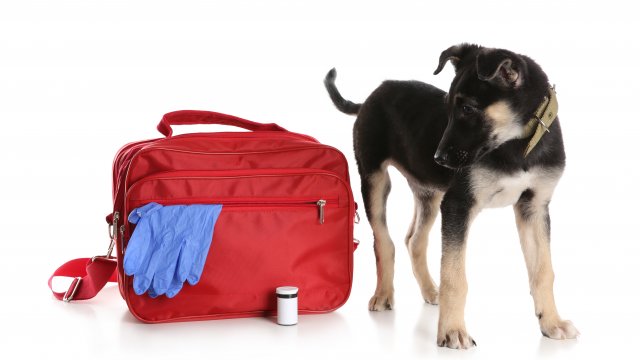Hurricanes, tornadoes, fires, floods, earthquakes, and other natural disasters are regular occurrences around the world. These unexpected events can cause chaos and confusion in communities – especially when an evacuation is required.
By planning ahead and creating an emergency plan that includes humans and pets, you can ensure that every family member will be prepared for the unknown, especially if you need to leave your home quickly.
Here’s how to prepare for your pup in case of emergency:
Create an emergency supply kit for your pet in an easy-to-carry bag. If possible, consider making two kits – one for home use, and a smaller one in case of evacuation. Be sure to include:
- At least a three-day supply of pet food, in an airtight waterproof container
- At least a three-day supply of water, specifically for your pet
- A water dish and food bowl
- Medicines, medical records, and vaccine records, in a sealed plastic bag
- A collar, identification tag, harness, and a sturdy leash
- A crate (if easily transportable) and blankets to keep warm in case of a power outage
- A picture of you and your pet together – if you become separated from your animal, you can show the picture to rescuers to easily prove ownership when they are found.
If you need to evacuate, familiarize yourself with safe, pet-friendly places to stay along your evacuation route. (BringFido.com is an excellent resource for identifying pet-friendly lodging.) Hotels and motels that normally prohibit non-service animals may allow pets during an emergency, so be sure to call ahead and confirm their policy. Make reservations in advance if you know there is a chance you may be forced to leave your home.
Ask friends, family, your vet, and boarding facilities in surrounding areas (but away from immediate danger) if they can care for your animal in case of an emergency. Create a list with phone numbers ahead of time to avoid searching for contact information under stress or time constraints.
Make sure your pet’s vaccinations are up to date, as many boarding facilities will require documentation before accepting your pup.
Keep collars and ID tags on your pets and ensure all tag identification information is up to date.
If possible, consider microchipping your pet - it's another way for rescuers to contact you when they find your pup if you are separated and their collar slips off.
Have decals on the windows near the front door of your home indicating what animals and how many are in the house. First responders will see this and can rescue them if you are not home.
Crate training increases the odds your dog will be comfortable and happy sleeping in one in emergency accommodation.
Before you head out of town for vacation, let a neighbor know how they can get into your home and where your emergency kit is, so they can assist in protecting your pets in case of danger.
If it isn't safe for you to stay in your home, it's not safe for your pet either! By taking the easy, important step of creating an emergency supply kit for your pets as well as your family, you will be prepared to take care of everyone in the event of a disaster.
